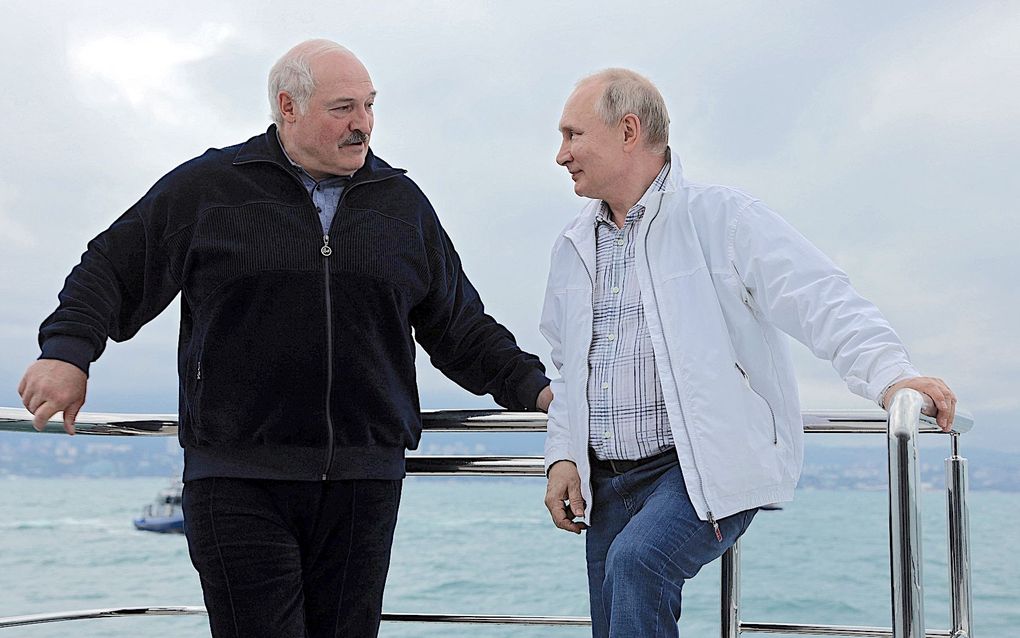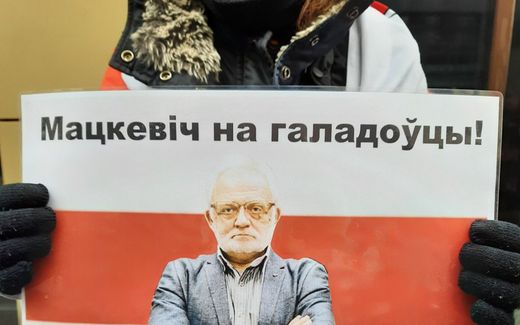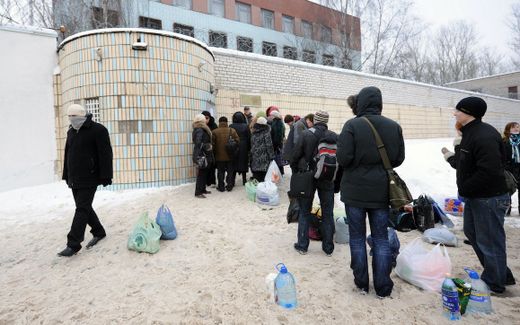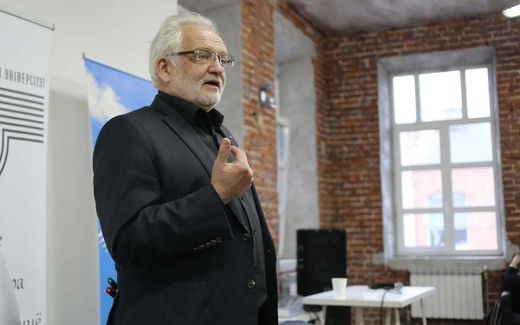Being a Belarusian now means being victim and aggressor at the same time
20-04-2022
Christian Life
Zmicier Chviedaruk, CNE.news

Belarusian president Lukashenko (l.) and Russian president Putin (r.). Photo EPA, Sergei Ilyin
Christian Life
February 24, the day of the Russian invasion of Ukraine, made life in Belarus even more difficult. At the beginning of the year, it seemed that the new realities of life in a lawless state managed by criminal concepts where "the strongest dictates its rules" were challenging enough. The Russian invasion of Ukraine revealed that we still do not fully understand the actual state of things.
Many Belarusians recalled the work of the German writer Erich Maria Remarque, especially his novel "Love Your Neighbor", written in 1939. The book's main character perfectly reflects our current conditions. It writes about the circumstances of a person who can no longer live in a fascist state but cannot be accepted by neighbouring countries either. After all, these countries treat a person who wants to leave the Third Reich country with suspicion, even if he does not have any way to escape that territory. In the eyes of foreigners, he is a potential aggressor and an unwanted troublemaker. At home, he is an insignificant and disfranchised being who permanently fears being arrested by the "Gestapo".
Part 1. You are the aggressors! Why didn't you throw yourself before the tanks?
At 5.00 a.m. local time, Putin's urgent address "about the beginning of a special operation" (as he calls it) and missiles from the territory of Belarus changed the lives of Russians and Ukrainians. However, it affected the lives of Belarusians as well. At the beginning of February, unexpectedly, without public notice to the citizens, with violations of international agreements, about 30,000 fully armed Russian soldiers came to the territory of Belarus. Soon there were even more of them. They deployed field hospitals, missile systems and "imperceptibly" hid on the border with Ukraine.
The citizens raised the alarm as much as possible, but the state said it was "just a joint exercise." On the morning of February 24, we all became aware that this was all preparation for a real war. Interestingly, until 2022, the phrase "no war ever again" was one of the main political slogans of Lukashenka's regime, and many of his followers used it.
Accordingly, thousands of accusations flew in our direction. People blamed the Belarusians for not stopping the war, not throwing themselves before the Russian tanks, not undermining railway tracks and for general aggression. They did not only blame Lukashenka and his junta. They also accused everyone suffering from the terrible political regime since the beginning of 2020 or those who were forced to run away far beyond the borders of their own country. The nation that asked for help from the outside but never received it.
It looks like foreign troops entered our country with the consent of a dictator who has no legitimacy and started controlling it fully. We turned into an unarmed and exhausted people, from whom, according to conservative estimates, 2,000 people are behind bars for political reasons. The lives of those who remain free cannot be connected with this word in any way since the state exercises strict control. It seems that we have sunk under a double occupation: the dictator and his main ally and sponsor – Russia. We found ourselves in Poland in 1968. From there, Soviet tanks started their way to Prague. We were called aggressors.
Part 2. We are victims. We have been brutally tortured for two years in a row
Victim syndrome is probably one of the hallmarks of our nation. If you managed to read the school literature curriculum in Belarus, a year's supply of handkerchiefs would not be enough as tears and snot would flood your neighbours below. Since childhood, we have been reminded of the terrible truth of life: that we are broken and helpless people. This story is not told from a Reformed theological perspective, of course. It is a materialistic Soviet narrative, which was supposed to maintain "Slavish silence" in the country and turn 10 million Belarusians into a herd of fatalists without their own identity.
But honestly speaking, after actively trying to achieve change in 2020 and 2021, we feel helpless. I will mention again that 70 per cent of people from Brest to Mogilev read the news with resentment. The news portrays them as the embodiment of Saruman (Sauron's chief assistant in The Lord of the Rings), who hides in its own house, anticipates arrest at any minute with a dark knock at their doors, and expects to be thrown behind bars on any charge: espionage, extremism, terrorism. And all this is not a sick fantasy of this column's author.
The attempt to become a more responsible nation has not yet been carried out as quickly and successfully as many would like. Our emotional state has turned 180 degrees. It seemed that the whole world was ready to stop our pain in its warm embrace, likes on social networks, and in the statements of influential politicians. That was only six months ago. Now, everything has changed, and people in Belarus again see themselves as helpless victims of the situation.
Some people in the country are risking their lives to sabotage the railway, just like during the Second World War, when Belarusian partisans stopped trains with Nazi troops. It has come to the point that armed special forces are on duty along the routes on the border with Belarus and Ukraine. People who, at least in such a desperate way, are trying to help a neighbouring country and stop Russian aggression are being shot.
But most people experience a terrible inner conflict, similar to a split personality. They feel the pain of not being able to stand aside and powerlessness to influence what is happening. As Jordan Peterson suggests, we can only keep our backs and shoulders straighter.
Finally, this is the condition in which we approached Easter in 2022
This year, people in Belarus felt a more substantial need to comprehend Easter more. As never before, we see the profound tragedy of a sinful man who, as if in a Michelangelo fresco "The Creation of Adam", can only fall and limply stretch out his hand in an unknown direction. We see how deeply corrupted the world is and how our inner world is corrupted above everything. We clearly understand that we cannot resist evil nor decide our fate solely by force of will (unless 7 million Belarusians commit the most collective act of mass suicide in history and get into the Guinness Book of Records).
At the bottom of our despair, in which we have fallen after the optimistic year of 2020, we now need hope more than ever. A transcendent hope, indestructible, which humans only have in Christ and through what the Father has done through the Son on the cross, which the Spirit seals in us forever. Hope, reminding that people under shelling in Mariupol, internal emigration in Putin's Russia, and tortured Belarus are not alone. Their current condition is not final.
The hope of Easter
The hope of Easter undoubtedly reminds us that the Son of God took upon Himself the sin of this world and showed us mercy. But the cross also turns us to God's judgment, which is approaching and to the restoration of justice in the world, including for Belarusians who are now experiencing a tragic personality split.
Today, for us, the solemn call "Christ is Risen" does not only speak about what has already happened. It also refers to what is yet to come, what is coming: the bitter taste of death, the sweet triumph of resurrection and the restoration of God's justice. Easter once again gives hope to those who are losing their homes and Motherland. That hope is based on the fact that Christ has provided space for us in a better Motherland – in a New Creation.
Related Articles





